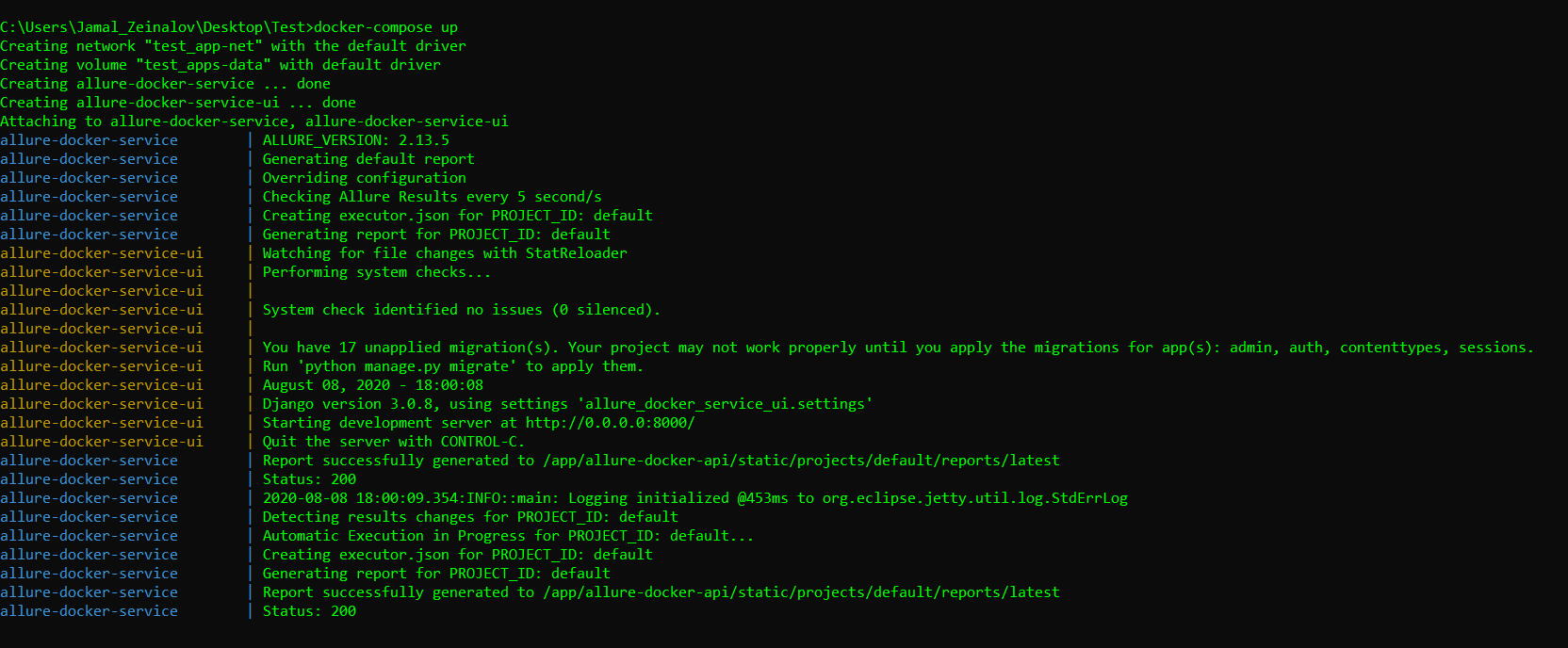Ecosyste.ms: Awesome
An open API service indexing awesome lists of open source software.
https://github.com/jamalzeynalov/allure_docker_service_ui
Available on DockerHub
https://github.com/jamalzeynalov/allure_docker_service_ui
allure allure-docker-service daily-reports
Last synced: about 1 month ago
JSON representation
Available on DockerHub
- Host: GitHub
- URL: https://github.com/jamalzeynalov/allure_docker_service_ui
- Owner: JamalZeynalov
- Created: 2020-07-14T10:23:38.000Z (over 4 years ago)
- Default Branch: master
- Last Pushed: 2024-04-25T13:43:08.000Z (8 months ago)
- Last Synced: 2024-04-25T14:48:56.198Z (8 months ago)
- Topics: allure, allure-docker-service, daily-reports
- Language: Python
- Homepage: https://hub.docker.com/repository/docker/jamalzeinalov/allure_docker_service_ui
- Size: 908 KB
- Stars: 2
- Watchers: 0
- Forks: 0
- Open Issues: 1
-
Metadata Files:
- Readme: README.md
Awesome Lists containing this project
README
# Daily Allure Reports
This web application is created to assemble all asynchronously uploading allure-results in one report.
This report will not be divided by launches. Each next bunch of test results during the day will update the daily report. If a test failed and then passed during the same date then its result will be overridden to the latest one ("passed").
And at the end of a day you will see how many of your tests were passed/failed/broken/skipped.
If you have multiple Test Automation projects with different tests and you want to get their latest results in one report then this app will be helpful for you.
You can push all results to this app and use allure annotations `@allure.epic`, `@allure.feature`, `@allure.story` to organize your tests.
This application is based on ["allure-docker-service"](https://github.com/fescobar/allure-docker-service) project.
## Dependencies:
You need to have following tools installed and set up on your machine:
* Docker client
* Git client
* python
* pip
## Installation with Docker:
#### 1. Create a new directory.
#### 2. Create following [`docker-compose.yml`](https://github.com/JamalZeynalov/allure_docker_service_ui/blob/master/docs/main_yaml/docker-compose.yml) file in the created directory:
```.yaml
version: "3.8"
services:
allure-docker-service-ui:
image: jamalzeinalov/allure_docker_service_ui
container_name: allure-docker-service-ui
environment:
ALLURE_SERVICE_HOST_NAME: allure-docker-service-api
ALLURE_SERVICE_PORT: 5050
ports:
- "8000:8000"
depends_on:
- allure-docker-service-api
networks:
- app-net
volumes:
- apps-data:/code/service_ui/static/projects
allure-docker-service-api:
image: frankescobar/allure-docker-service
container_name: allure-docker-service
environment:
CHECK_RESULTS_EVERY_SECONDS: 5
KEEP_HISTORY: "FALSE"
ports:
- "5050:5050"
volumes:
- apps-data:/app/allure-docker-api/static/projects
networks:
- app-net
networks:
app-net:
volumes:
apps-data:
```
#### 2. Run `docker-compose up` command in the created directory:
Note: Accept all disc sharing requested by Docker! This is required to mount applications volumes.
Also you can run `docker-compose up -d` command to run containers in detached mode.
The command line output should look like this:

Now both services are running and you can start using them. (do not terminate this process)
> Note: The image "not content available" will be displayed until some results are uploaded.
## Usage:
You can use ["allure-results-sample"](https://github.com/JamalZeynalov/allure-results-sample) project to generate some test results.
Follow the steps in the project Readme.md description.
In "allure-results-sample" project (and in this repository too) you can find ["send_allure_results.py"](https://raw.githubusercontent.com/JamalZeynalov/allure_docker_service_ui/master/docs/send_allure_results.py) file.
This file contains python script to send allure results to the locally running service.
More ways to send results you can find [here](https://github.com/fescobar/allure-docker-service#send-results-through-api).
> After the service is deployed you have to modify parameters accordingly to send results:
> Set "project_id" in ISO 8601 date format (YYYY-MM-DD).
> Set a hostname of the running AllureDockerService app in "docker_allure_service_url" variable.
After some results are uploaded you can navigate to the application home page and check reports:
[http://localhost:8000](http://localhost:8000)
The allure docker service swagger documentation is available at the following link:
[http://localhost:5050/allure-docker-service/swagger](http://localhost:5050/allure-docker-service/swagger)
## Web Pages:
#### 1. Dashboard
On this page a user can navigate through up to 10 latest daily reports. By default, a user is redirected to the latest daily report.
Also the `Latest` button will always lead to the newest available report.

You can use these reports as usual. All allure report features are available.

#### 2. All Reports
This page contains links to all available daily reports. The number of reports on this page is not limited.

#### 2. Daily History
This page contains a graph with results of latest 10 daily reports.

#### 3. Delete Reports
In order to delete some report, you should click on the according button and confirm deletion in the alert window. The deleted report will not be available.
